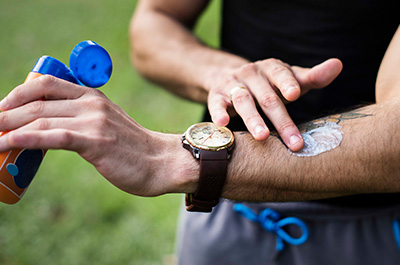It’s a skincare conundrum: You love the sun-kissed glow, but UV rays increase your risk of skin cancer and cause premature aging. Products like low-SPF tanning oils and self-tanners claim to give you a bronzed look without the burn, but do they deliver?
Here, Henry Ford Health family medicine physician Emilyn Anderi, M.D., provides evidence-based answers about tanning products.
Are Low-SPF Tanning Oils Safe?

Family Medicine At Henry Ford
An appealing product sits next to the sunscreen on store shelves: low-SPF tanning oil. At first glance, this seems like the best of both worlds. A tan with some extra protection baked in? Yes, please!
Unfortunately, these products won’t save your skin from a painful sunburn or skin cancer. “Low SPF tanning oils don’t provide adequate sun protection,” says Dr. Anderi. “The oil can attract UV rays to your skin, and that tiny amount of SPF won’t counteract this effect.”
Instead, look for a sunscreen with the words “broad spectrum” on the label. “Choose a formula with a minimum of SPF 30—ideally SPF 50 for the best protection,” says Dr. Anderi.
Does a ‘base tan’ protect you from sunburn?
Many people use low-SPF tanning oils to get a “base tan.” The idea is that getting a light tan (aka base tan) before a day at the beach or a sunny vacation will protect you from burning. This approach does more harm than good.
“A so-called base tan does not protect you from premature aging or skin cancer,” says Dr. Anderi. “Any tan—even a light one—is a sign that the sun has damaged your skin. And at best, a base tan is like SPF 3, but it might not even provide that much protection.”
Is Sunless Tanning Safe?
The sunless tanning industry has exploded in popularity since people have become more aware of the risks of sun exposure. Self-tanning sprays, gels, lotions and foams promise to give you the look of a tan, no sun required. But are they safe?
“Sunless tanners are the only safe option if you want to get a tan,” says Dr. Anderi. “The active ingredient in these products, DHA (dihydroxyacetone), reacts with your outer layer of skin, causing the tan appearance. This ingredient is FDA-approved to use on your skin.”
Just be careful with spray products and sunless tanning booths. DHA isn’t FDA-approved in spray form. “There could be risks to inhaling DHA or getting it in your eyes, nose or mouth,” says Dr. Anderi. “The safest route is to use lotions, creams and gels.”
Do self-tanners provide sun protection?
It’s tempting to skip the sunscreen once you’ve achieved a sunless tan, but don’t do it. These products don’t offer any sun protection, so your skin is just as vulnerable to UV rays.
“Some sunscreens leave a white cast that people may not like, especially if they spent time achieving a sunless tan,” says Dr. Anderi. “You can avoid this issue by choosing a sunscreen with a tint or temporary bronzer built in.”
Choose the Sun Protection You’ll Use
Skin cancer is the most common cancer in the U.S., so proper sun protection is essential. Fortunately, there are many sunscreen options to keep your skin safe. “The best sunscreen is the one you’ll wear every day, so find a formula you like,” says Dr. Anderi. “If it provides broad spectrum protection and a minimum of SPF 30, it will do the job.”
Reviewed by Emilyn Anderi, M.D., family medicine physician at Henry Ford Medical Center - Harbortown.



